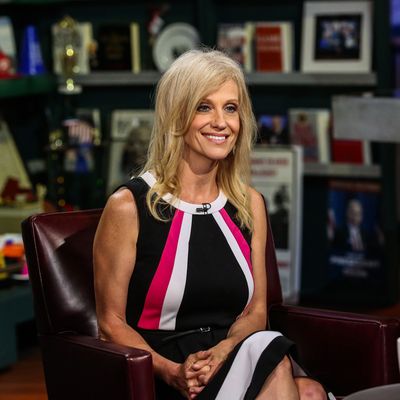
Most of the buzz surrounding Donald Trump’s latest campaign “shake-up” has naturally focused on Team Trump’s new CEO, former Breitbart News executive Stephen Bannon, the man credited (or blamed) with turning Breitbart into an abrasive house organ for Trump’s primary and then general-election campaigns. Earlier this cycle, Bannon was called “the most dangerous political operative in America” in a much-savored profile by Bloomberg’s Joshua Green. His sudden appearance at the top of the campaign hierarchy, reportedly as part of an effort to “let Trump be Trump” at the expense of Paul Manafort’s strategy of “normalizing” the mogul, has political junkies salivating at the vicious and violent tactics we can presumably anticipate in the very near future.
But the other key player in the “shake-up” is interesting as well: new campaign manager Kellyanne Conway, a veteran Republican pollster, “strategist,” cable gabber, and Beltway insider who has made something of a specialty out of teaching wild men how to be less threatening to swing voters, especially women.
Early in her political career, when she was a fixture of the D.C. Republican landscape, you wouldn’t have figured Kellyanne Fitzpatrick (as she was then named) for someone who would be hanging out with the Attila-like conqueror of the Republican Establishment. Known formally as the founder of her own polling company (after an apprenticeship with top GOP pollster Richard Wirthlin), she was a regular on the talk-show circuit, and something of a Beltway social star and fashion plate, the sort of person who was “romantically linked” with big-time GOP pols like the late Senator Fred Thompson (a client, as it happens). She later married a prominent New York attorney, had four kids, and burnished her reputation by co-authoring a 2005 book on the rising influence of women with distinguished Democratic pollster Celinda Lake.
Conway’s next bout of national fame occurred in 2012, when she was frequently in the news defending another client, Missouri Senate candidate Todd Akin, after his self-destructive comments opposing a “rape” exception for a hypothetical abortion ban on grounds that women’s bodies had mysterious ways of avoiding conception in cases of “legitimate rape.” By 2014, she had used her experience with Akin to develop a rap (delivered on one occasion to a House Republican Conference retreat) on how conservative pols could avoid offending women without, of course, changing their positions on issues like abortion. Her close relations with cultural conservatives before and after the Akin disaster make it unsurprising when she resurfaced early in the 2016 cycle as head of a pro–Ted Cruz super-pac funded by hedge-fund tycoon Robert Mercer. But even as Cruz himself declined to endorse Trump after losing to him in the primaries, Conway (who apparently has known Trump for years) followed Mercer into the mogul’s tent, with the super-pac rechristening itself as “Defeat Crooked Hillary PAC” in June, and Conway leaving to serve as an adviser to the candidate. Her bonds were strengthened when another of her cultural-conservative clients, Mike Pence, was chosen as Trump’s running mate (yet another Conway client, Newt Gingrich, was a runner-up).
As to what she brings to the campaign, theories differ. She was billed as a “gender gap” expert when she first came onboard, and today the Washington Post speculates that she might prove an asset to a candidate who is not doing well with college-educated women. Her former Cruz campaign colleague Rick Tyler (who is affiliated with #NeverTrump independent candidate Evan McMullin) suggests, however, that Conway’s real utility is as a professional pollster who can scratch Trump’s itch for public-opinion morsels pre-masticated to make him feel like a winner. Either way, she, and we, are probably in for a wild ride between now and November.






























